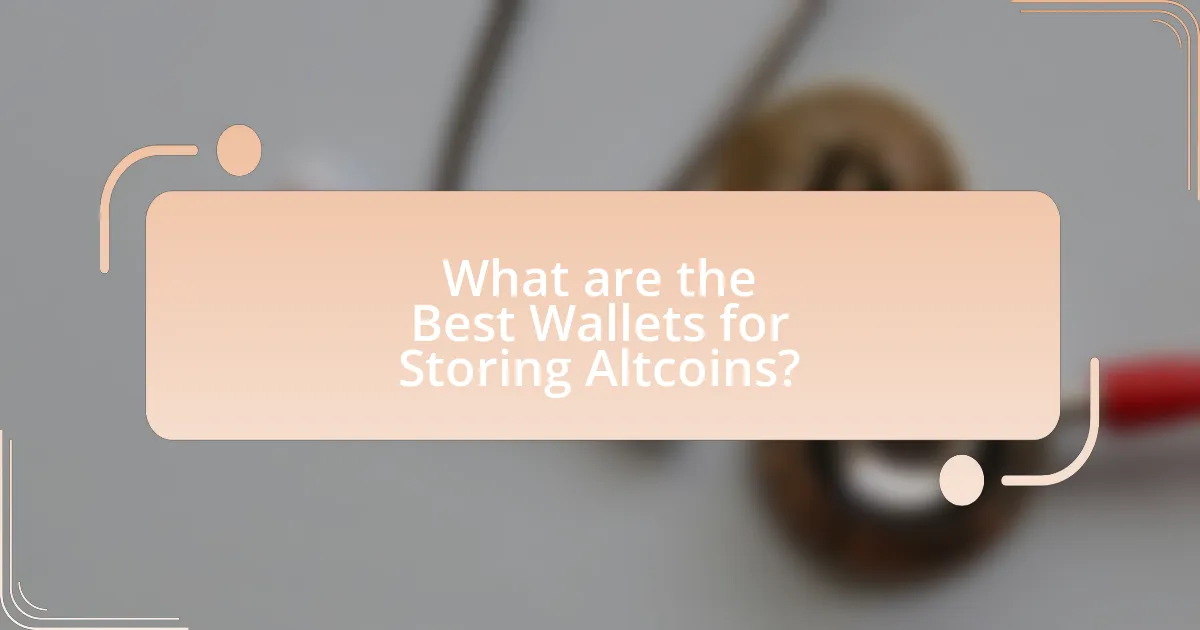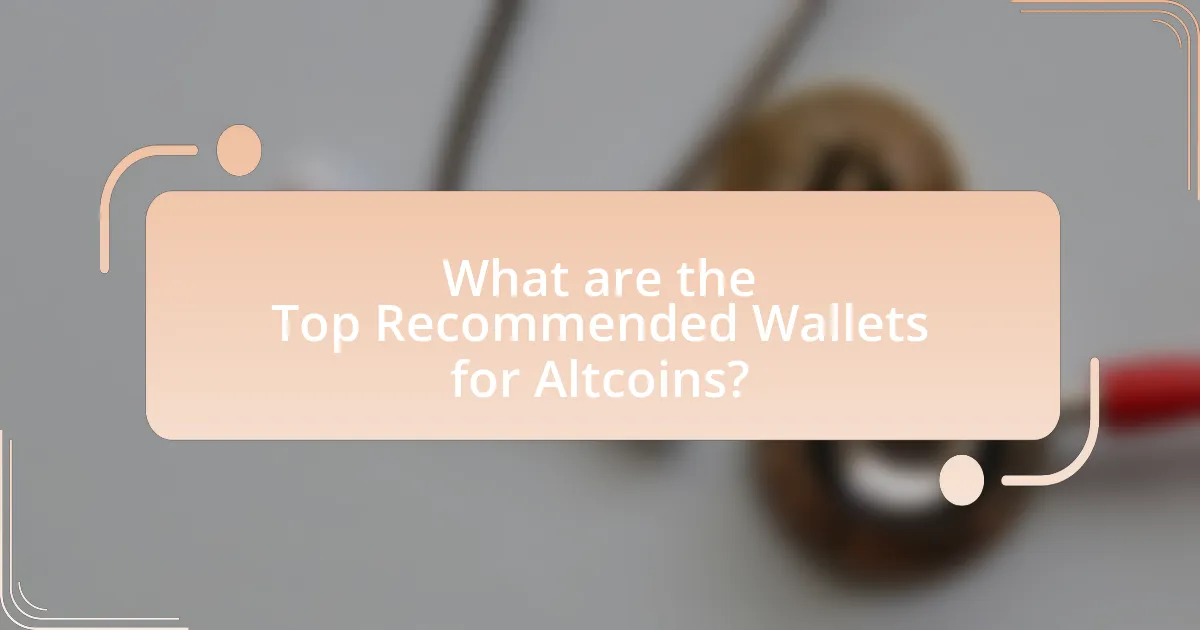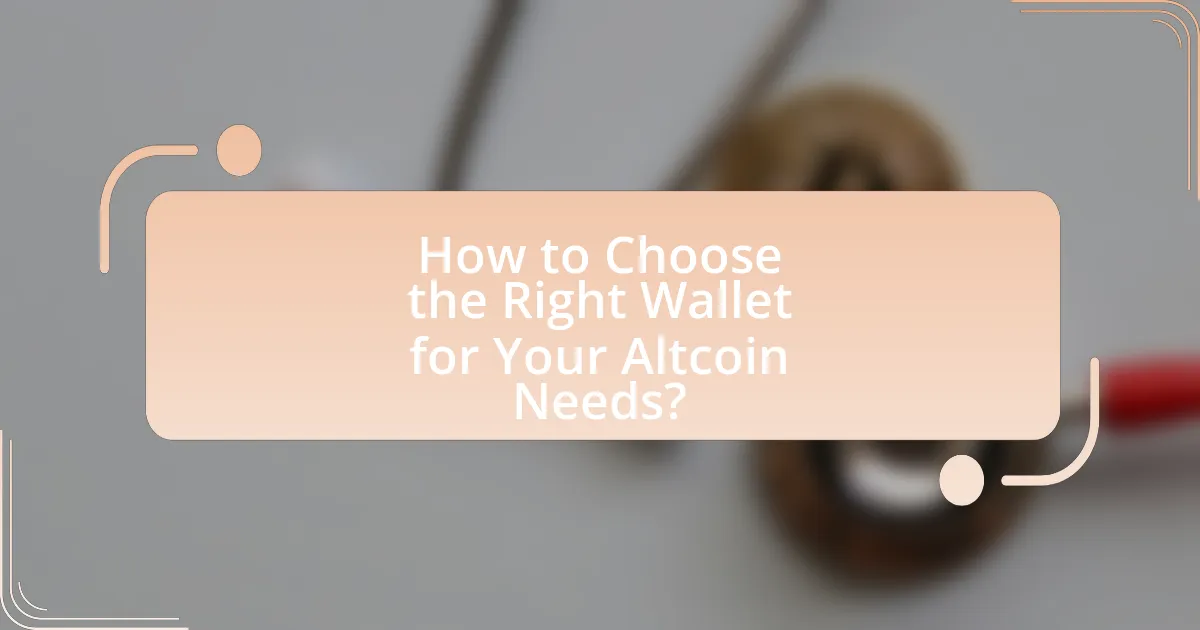The article focuses on the best wallets for storing altcoins, highlighting various options such as hardware wallets like Ledger Nano X and Trezor Model T, and software wallets including Exodus and Atomic Wallet. It discusses the security features, usability, and compatibility of different wallet types, emphasizing the importance of selecting a wallet that aligns with specific altcoin needs. Key considerations include security measures, user control over private keys, and the ability to manage multiple cryptocurrencies efficiently. The article also outlines common mistakes to avoid when choosing a wallet and provides tips for effective altcoin management.

What are the Best Wallets for Storing Altcoins?
The best wallets for storing altcoins include hardware wallets like Ledger Nano X and Trezor Model T, as well as software wallets such as Exodus and Atomic Wallet. Hardware wallets provide enhanced security by keeping private keys offline, making them less vulnerable to hacking. For instance, Ledger Nano X supports over 1,800 cryptocurrencies, ensuring a wide range of altcoin storage options. Software wallets like Exodus offer user-friendly interfaces and support for multiple altcoins, making them accessible for everyday users. According to a report by Cointelegraph, hardware wallets are considered the safest option for long-term storage of cryptocurrencies, including altcoins.
How do different types of wallets cater to altcoin storage?
Different types of wallets cater to altcoin storage by offering varying levels of security, accessibility, and compatibility with multiple cryptocurrencies. Hardware wallets, such as Ledger and Trezor, provide high security for altcoins by storing private keys offline, making them less vulnerable to hacking. Software wallets, including mobile and desktop options, offer convenience and quick access to altcoins but may expose users to online threats. Web wallets, like those provided by exchanges, allow for easy trading and management of altcoins but often lack robust security features. Each wallet type addresses specific user needs, balancing security and usability based on the nature of the altcoins being stored.
What are the main categories of wallets available for altcoins?
The main categories of wallets available for altcoins are hardware wallets, software wallets, and paper wallets. Hardware wallets, such as Ledger and Trezor, provide secure offline storage for private keys, making them resistant to hacking. Software wallets can be further divided into desktop, mobile, and web wallets, offering varying levels of convenience and security. Paper wallets involve printing out the private keys and public addresses, providing a physical form of storage that is immune to online threats. Each category serves different user needs, balancing security and accessibility.
How do hardware wallets compare to software wallets for altcoin storage?
Hardware wallets provide superior security for altcoin storage compared to software wallets. Hardware wallets store private keys offline, significantly reducing the risk of hacking and malware attacks, while software wallets, which are connected to the internet, are more vulnerable to cyber threats. According to a report by the Cybersecurity & Infrastructure Security Agency, hardware wallets are considered one of the safest options for cryptocurrency storage due to their ability to keep sensitive information isolated from online environments. This distinction makes hardware wallets a preferred choice for users prioritizing security in their altcoin investments.
What features should you look for in an altcoin wallet?
When selecting an altcoin wallet, prioritize security features, user control over private keys, and compatibility with multiple cryptocurrencies. Security features such as two-factor authentication and encryption protect assets from unauthorized access. User control over private keys ensures that only the wallet owner has access to their funds, reducing reliance on third parties. Compatibility with multiple cryptocurrencies allows users to manage various altcoins in one place, enhancing convenience. According to a report by the Cambridge Centre for Alternative Finance, wallets that support a wide range of cryptocurrencies are increasingly preferred by users for their versatility and ease of use.
How does security play a role in choosing an altcoin wallet?
Security is a critical factor in choosing an altcoin wallet because it directly impacts the safety of the user’s digital assets. A secure wallet protects against unauthorized access, hacking attempts, and potential loss of funds. For instance, wallets that offer features such as two-factor authentication, encryption, and cold storage significantly reduce the risk of theft. According to a report by CipherTrace, over $1.9 billion was lost to cryptocurrency theft in 2020, highlighting the importance of robust security measures in wallet selection. Therefore, prioritizing security features when selecting an altcoin wallet is essential for safeguarding investments.
What user-friendly features enhance the experience of using an altcoin wallet?
User-friendly features that enhance the experience of using an altcoin wallet include intuitive interfaces, multi-currency support, and robust security measures. Intuitive interfaces allow users to navigate the wallet easily, reducing the learning curve for new users. Multi-currency support enables users to manage various altcoins within a single wallet, streamlining the process of tracking and transacting with different cryptocurrencies. Robust security measures, such as two-factor authentication and encryption, protect users’ assets, fostering trust and confidence in the wallet’s safety. These features collectively improve user satisfaction and engagement with altcoin wallets.
Why is it important to choose the right wallet for your altcoins?
Choosing the right wallet for your altcoins is crucial for ensuring the security and accessibility of your digital assets. A suitable wallet protects against theft, hacking, and loss, which are prevalent risks in the cryptocurrency space. For instance, hardware wallets, such as Ledger and Trezor, provide offline storage, significantly reducing the risk of online attacks. Additionally, selecting a wallet that supports the specific altcoins you own is essential, as not all wallets are compatible with every cryptocurrency. This compatibility ensures that you can manage and transact with your altcoins without issues. Therefore, the right wallet not only safeguards your investments but also facilitates their effective management.
What risks are associated with using the wrong wallet for altcoin storage?
Using the wrong wallet for altcoin storage exposes users to significant risks, including loss of funds, security vulnerabilities, and compatibility issues. Loss of funds can occur if a wallet does not support the specific altcoin, leading to permanent inaccessibility of the assets. Security vulnerabilities arise from using wallets that lack robust encryption or are not regularly updated, making them susceptible to hacks and malware attacks. Compatibility issues can prevent users from accessing their altcoins or utilizing features like staking or trading, which are often supported only by specific wallets. According to a report by CipherTrace, over $1.9 billion was lost to cryptocurrency theft in 2020, highlighting the importance of selecting a secure and compatible wallet for altcoin storage.
How can the right wallet improve your altcoin management?
The right wallet can significantly enhance your altcoin management by providing secure storage, easy access, and efficient transaction capabilities. A secure wallet protects your assets from hacks and theft, which is crucial given that over $1.9 billion was lost to cryptocurrency theft in 2021 alone. Additionally, wallets with user-friendly interfaces allow for quick transactions and easy tracking of multiple altcoins, streamlining the management process. For instance, hardware wallets like Ledger and Trezor offer robust security features while supporting a wide range of altcoins, making them ideal for effective management.

What are the Top Recommended Wallets for Altcoins?
The top recommended wallets for altcoins include Ledger Nano X, Trezor Model T, Exodus, and Atomic Wallet. Ledger Nano X is a hardware wallet known for its security features and support for over 1,800 cryptocurrencies. Trezor Model T also offers robust security and a user-friendly interface, supporting a wide range of altcoins. Exodus is a software wallet that provides an intuitive design and built-in exchange features, while Atomic Wallet allows users to manage multiple cryptocurrencies and offers a decentralized exchange option. These wallets are widely recognized for their reliability and security in storing altcoins.
Which wallets are considered the best for security and usability?
The best wallets for security and usability are hardware wallets like Ledger Nano X and Trezor Model T. These wallets provide robust security features such as private key storage offline, which significantly reduces the risk of hacking. According to a report by the Blockchain Security Alliance, hardware wallets are considered the most secure option for storing cryptocurrencies due to their resistance to malware and phishing attacks. Additionally, both Ledger and Trezor offer user-friendly interfaces, making them accessible for both beginners and experienced users.
What are the standout features of the top hardware wallets for altcoins?
The standout features of the top hardware wallets for altcoins include robust security measures, multi-currency support, user-friendly interfaces, and backup and recovery options. These wallets, such as Ledger Nano X and Trezor Model T, utilize advanced encryption and secure chip technology to protect private keys, ensuring that users’ assets remain safe from hacking attempts. Additionally, they support a wide range of altcoins, allowing users to manage multiple cryptocurrencies in one place. The intuitive interfaces of these wallets facilitate easy navigation and transaction management, while built-in backup and recovery features, such as seed phrases, provide peace of mind in case of device loss or failure.
How do popular software wallets perform in terms of security and features?
Popular software wallets generally offer a range of security features, including encryption, two-factor authentication, and backup options, while also providing user-friendly interfaces and multi-currency support. For instance, wallets like Exodus and Atomic Wallet utilize strong encryption methods to protect private keys, and they often include features such as seed phrase recovery to enhance security. Additionally, many software wallets support multiple cryptocurrencies, allowing users to manage various assets in one place, which is a significant feature for altcoin storage. According to a report by the Blockchain Research Institute, the integration of security measures and user-friendly features is crucial for the adoption of software wallets, as it directly impacts user trust and satisfaction.
What are the pros and cons of using specific altcoin wallets?
Using specific altcoin wallets has distinct pros and cons. The advantages include enhanced security features, such as private keys stored offline in hardware wallets, which protect against hacking. Additionally, many altcoin wallets offer user-friendly interfaces and support for multiple cryptocurrencies, making them accessible for both beginners and experienced users. On the downside, some altcoin wallets may have limited customer support, which can be problematic for users needing assistance. Furthermore, certain wallets may charge transaction fees or have restrictions on the types of altcoins supported, limiting user flexibility.
What advantages do multi-currency wallets offer for altcoin users?
Multi-currency wallets provide altcoin users with the advantage of managing multiple cryptocurrencies in a single platform, simplifying transactions and enhancing convenience. This centralized management allows users to easily exchange between different altcoins without needing to transfer funds across various wallets or exchanges, which can incur additional fees and time delays. Furthermore, many multi-currency wallets offer enhanced security features, such as private keys stored locally and two-factor authentication, which protect users’ assets from potential hacks. According to a report by Statista, the number of cryptocurrencies has grown significantly, reaching over 10,000 in 2021, highlighting the need for efficient management solutions like multi-currency wallets.
How do specialized wallets for specific altcoins compare to general wallets?
Specialized wallets for specific altcoins offer enhanced features tailored to the unique requirements of those cryptocurrencies, while general wallets provide broader compatibility across multiple coins but may lack specific functionalities. For instance, specialized wallets often support advanced features such as staking, governance voting, or unique security measures that align with the altcoin’s ecosystem, which general wallets may not provide. Additionally, specialized wallets can optimize transaction speeds and fees for their respective altcoins, whereas general wallets may not be as efficient in these areas due to their broader focus. This distinction is crucial for users who prioritize specific functionalities or security measures associated with particular altcoins.

How to Choose the Right Wallet for Your Altcoin Needs?
To choose the right wallet for your altcoin needs, assess the wallet’s compatibility with the specific altcoins you intend to store. Different wallets support different cryptocurrencies; for instance, hardware wallets like Ledger and Trezor support a wide range of altcoins, while software wallets may have limited options. Additionally, consider the wallet’s security features, such as two-factor authentication and private key control, which are crucial for protecting your assets. Research shows that hardware wallets are generally regarded as the most secure option, with a 2021 report indicating that 78% of cryptocurrency thefts occur in software wallets due to vulnerabilities. Therefore, selecting a wallet that aligns with your altcoin portfolio and prioritizes security is essential for effective asset management.
What factors should influence your decision when selecting an altcoin wallet?
When selecting an altcoin wallet, security features should be the primary factor influencing your decision. A wallet must provide robust security measures such as two-factor authentication, encryption, and backup options to protect your assets from theft or loss. According to a report by CipherTrace, over $1.9 billion was lost to cryptocurrency theft in 2020, highlighting the importance of security in wallet selection. Additionally, consider the wallet’s compatibility with various altcoins, user interface, transaction fees, and customer support, as these factors can significantly impact your overall experience and accessibility to your funds.
How does your level of experience with cryptocurrencies affect wallet choice?
Your level of experience with cryptocurrencies significantly affects wallet choice, as beginners typically prefer user-friendly wallets, while experienced users may opt for more complex options that offer advanced features. Beginners often choose mobile or web wallets due to their ease of use and accessibility, which allow for quick transactions and straightforward interfaces. In contrast, experienced users might select hardware wallets or desktop wallets that provide enhanced security and control over private keys, as they are more familiar with the risks and benefits associated with different wallet types. According to a survey by Statista in 2021, 39% of cryptocurrency users reported using mobile wallets, indicating a preference among less experienced users for convenience, while more seasoned users often prioritize security features found in hardware wallets.
What role does the type of altcoins you own play in wallet selection?
The type of altcoins you own significantly influences wallet selection due to compatibility and security features. Different altcoins operate on various blockchain protocols, necessitating wallets that support those specific networks. For instance, ERC-20 tokens require wallets compatible with the Ethereum blockchain, while Bitcoin-based altcoins need wallets that support Bitcoin’s network. Additionally, some wallets offer enhanced security features tailored to specific altcoins, such as multi-signature options for higher-value assets. Therefore, selecting a wallet that aligns with the specific altcoins ensures both accessibility and protection of your digital assets.
What are some common mistakes to avoid when choosing an altcoin wallet?
Common mistakes to avoid when choosing an altcoin wallet include neglecting security features, overlooking compatibility with specific altcoins, and failing to research the wallet’s reputation. Security features such as two-factor authentication and private key control are essential to protect assets from theft. Compatibility is crucial because not all wallets support every altcoin, which can lead to loss of funds if the wrong wallet is used. Researching the wallet’s reputation through user reviews and expert recommendations helps ensure reliability and trustworthiness, as wallets with poor reputations may have vulnerabilities or lack customer support.
How can you ensure you are not compromising on security for convenience?
To ensure you are not compromising on security for convenience, select wallets that offer robust security features while maintaining user-friendly interfaces. For instance, hardware wallets like Ledger and Trezor provide high-level security through offline storage of private keys, yet they are designed for easy transactions. Research indicates that hardware wallets are among the safest options for storing cryptocurrencies, with Ledger reporting that their devices have never been hacked. Additionally, utilizing wallets with multi-factor authentication and strong encryption can enhance security without sacrificing convenience, as these features are increasingly integrated into user-friendly platforms.
What should you verify before trusting a wallet with your altcoins?
Before trusting a wallet with your altcoins, you should verify its security features, reputation, and compatibility with your specific altcoins. Security features include two-factor authentication, encryption methods, and backup options, which protect your assets from unauthorized access. The wallet’s reputation can be assessed through user reviews, expert recommendations, and its history of security breaches, as a well-regarded wallet is less likely to compromise your funds. Compatibility is crucial because not all wallets support every altcoin; therefore, confirming that the wallet can store your specific altcoins ensures you can manage your assets effectively.
What tips can help you effectively manage your altcoin wallet?
To effectively manage your altcoin wallet, regularly update your wallet software to ensure security and access to new features. Keeping the software current protects against vulnerabilities, as outdated versions can be exploited by hackers. Additionally, use strong, unique passwords and enable two-factor authentication to enhance security. Research shows that wallets with two-factor authentication are significantly less likely to be compromised. Regularly back up your wallet data to prevent loss in case of device failure, and consider using hardware wallets for long-term storage, as they provide a higher level of security compared to software wallets.